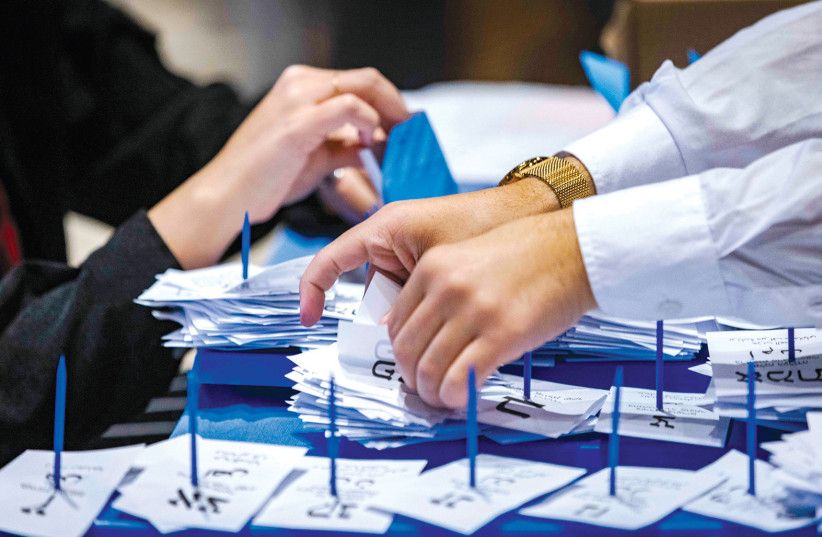Around the change from Apartheid to democracy in 1994, the South African Jewish Board of Deputies issued a poster in conjunction with the American Jewish Congress, a faded copy of which hangs in my home. A photo of near-naked babies of assorted races playing together on the floor is headlined by the words “No one is born hating.”
In “Long March to Freedom,” Nelson Mandela, who led the Black resistance and was to preside over South Africa during its remarkable transition from racism to equality, wrote, “No one is born hating another person because of the color of his skin, or his background, or his religion. People must learn to hate, and if they can learn to hate, they can be taught to love…”
As Israel holds local elections today, which by definition emphasize disagreements and generate division and contrariness, here are two examples that show a different way.

The Jewish Telegraphic Agency reported that the Jerusalem sports center, where I am a member, inspired a New York musical, Swimming in Jerusalem. Eric Krebs, a producer, read a New York Times piece about a swim team that trains at the Sylvan Adams Sports Center, aka Jerusalem YMCA, on King David Street. Over the years, young swimmers have obeyed the unwritten rule that politics is not to be discussed in the pool. That changed after October 7, when the Jewish swimmers were flabbergasted by the attitude of their fellow swimmers toward the atrocities, while their Arab counterparts felt that the world ignored their people’s ongoing plight. In an optimistic message, the dramatized team overcomes the tension and unites for the joint goal of success.
In this complicated city, arguably the most complex in the world, the sports center could possibly serve as a model for how Jerusalem can function. Where 40% of the populace is Arab (most of whom reside in areas that were annexed to Jerusalem after the Six Day War in 1967 and who became residents of Israel but remained citizens of Jordan, a complication in itself) and 30% are ultra-Orthodox Jews, it is important to accept and respect the presence of “the other” and learn to cooperate.
I will not pretend that my return to the YMCA after October 7 was free of any heavy-hearted feelings or suspicion. But in a city that defines itself as the “eternal united capital of Israel” (although it is divided, querulous, and also poor), it is advisable to find a way to live together, swim together, sweat together in the sauna, and smile to see the Jewish, Muslim, and Christian children (and teachers) of the Y’s unique “Peace Kindergarten.”
Kibbutz Kramim in the eastern Negev (near Meitar) is home to some 100 families. Several of the founders remain, but most of the current members are relative newcomers who made a deliberate choice to live in a mixed community of religious and secular Jews. The ratio is maintained with every expansion so that both groups are comfortable and do not feel like a minority. The newly built neighborhoods in the kibbutz are mixed, and it is not possible for people to only have neighbors who are just like them.
Mutual respect and consideration
How does it work? With consideration and mutual respect. For example, the pool is open on Shabbat but music is not to be played and noise is avoided. There is a common kindergarten. In the morning, some children have prayers and others have a meeting. Schools, both religious and secular, are outside kibbutz but children who grow up as neighbors learn to know and respect each other. They understand that there is a valid truth elsewhere, that it is necessary to be considerate, and that it is not vital to persuade or to be persuaded.
I ASKED a young man who grew up in an Orthodox Bnei Akiva kibbutz why he chose to raise his family in Kramim. He explained that during the disengagement from Gaza in 2005, he understood that self-isolating in ghetto-like communities with like-minded people, who are convinced that theirs is the only legitimate way, who do not understand “the other” and feel that they must overcome the opponent, causes irreparable harm to society and to the country. In order to survive and flourish, there must be constructive dialogue between all sectors of the population. The country is not a contest but a collaborative effort. This is the guiding principle of about 20 similar communities and about 150 educational structures under the auspices of Meitarim, an organization that aims to create a cultural infrastructure for a shared life.
When Mandela said that people can be taught to love, he explained that “love comes more naturally to the human heart than its opposite.” He may be right or he may be wrong. At this time, instead of having to choose between opposing emotions, let us be satisfied with tolerance and respect.
The writer was Israel’s first ambassador to the Baltic states after the disintegration of the Soviet Union, ambassador to South Africa, and congressional liaison officer at the embassy in Washington. She is a graduate of Israel’s National Defense College.
